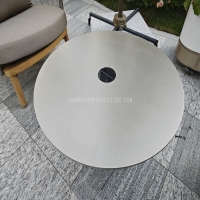Welcome to the website for landscape facilities products and knowledge.
What are the most common manufacturing defects in landscape round trash cans, and how are they detected?
Landscape round trash cans are essential for maintaining clean and organized outdoor spaces, but manufacturing defects can compromise their durability and functionality. The most common defects include uneven welding seams, surface cracks, poor paint adhesion, structural instability, and mold misalignment.
Uneven welding seams often occur due to improper machine calibration or human error, leading to weak joints that may break under stress. Surface cracks can result from low-quality materials or excessive force during production. Poor paint adhesion, such as peeling or bubbling, is typically caused by inadequate surface preparation or incorrect paint application. Structural instability, like wobbling or tilting, may stem from uneven base design or subpar materials. Mold misalignment creates asymmetrical or misshapen bins, affecting both aesthetics and functionality.
To detect these defects, manufacturers employ visual inspections, stress tests, and precision measuring tools. Automated systems scan for surface irregularities, while manual checks ensure welding quality and structural integrity. Advanced techniques like ultrasonic testing can identify hidden cracks or weak spots. By addressing these issues early, manufacturers can deliver high-quality, long-lasting landscape trash cans.
Related search:

Recommendation
Outdoor stainless steel table with solar-powered ambient lighting feature - excellent design.